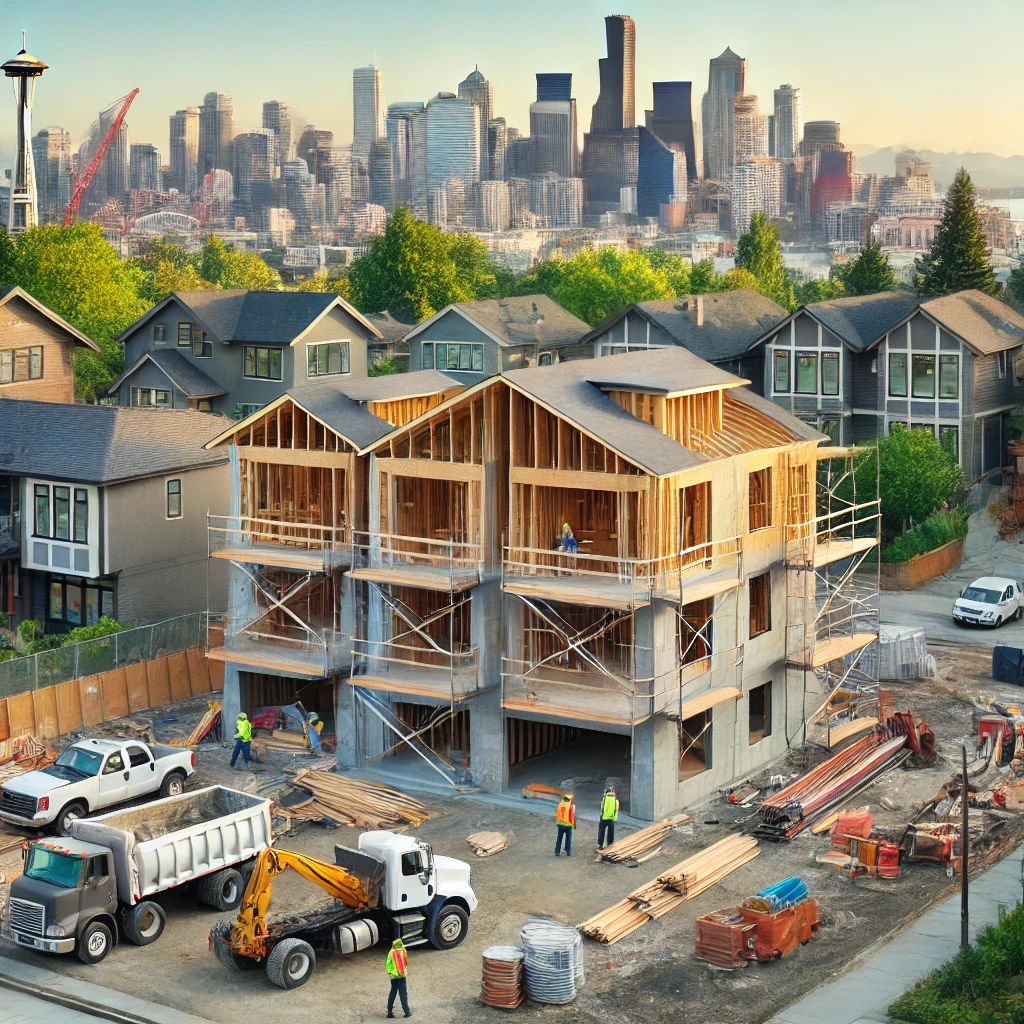Building a new home is a dream for many, but in a city like Seattle, where land is scarce and construction costs are high, it can feel like a daunting financial challenge. Understanding the true costs of building a home in Seattle is essential before embarking on such a project. It’s not just about finding a piece of land and hiring a contractor—it involves navigating local regulations, managing rising construction costs, and ensuring you’re making the right choices for long-term value.
This guide will break down the major expenses involved in building a home in the Seattle area and give you a clear idea of how much you should budget. We’ll also dive into the factors that can drive up costs, offering tips on how to control your budget without sacrificing quality.
1. The Cost of Land: Location Is Everything
The first major expense when building a new home in Seattle is, of course, the land. In a market where available land is limited and competition is fierce, the cost of land alone can be a significant portion of your budget.
- Average Lot Prices: In the Seattle metro area, the average cost for a buildable lot can range from $200,000 to $600,000, depending on location. Prices tend to be higher in neighborhoods like Capitol Hill, Queen Anne, or Madison Park, where proximity to the city center and stunning views drive up demand.
- Land in Suburban Areas: In suburbs like Shoreline, Bothell, or Issaquah, land prices tend to be lower, ranging from $150,000 to $350,000, but this can vary depending on the lot size and proximity to amenities and transportation.
- Preparation Costs: Don’t forget to factor in the cost of preparing the land for construction. This includes demolition (if there’s an existing structure), grading, and site utilities, which can add anywhere from $10,000 to $50,000 to your project.
Pro Insight: If you’re looking to save on land costs, consider neighborhoods that are undergoing gentrification or those slightly outside Seattle’s core but still close to future infrastructure projects, like light rail expansions. Areas like Northgate or Mountlake Terrace offer potential long-term value at a lower upfront cost.
2. Permits and Fees: Navigating Seattle’s Regulations
Seattle is known for its strict building codes and regulations, which means you’ll need to secure various permits before construction begins. These permits come with fees, and the process can be time-consuming, especially if your home requires variances or special permissions.
- Building Permit Costs: Building permits in Seattle generally range from $10,000 to $25,000, depending on the size and complexity of your project. Larger homes or custom builds will often be on the higher end of the scale.
- Impact Fees: Seattle imposes impact fees to help fund local infrastructure improvements like roads, schools, and parks. These fees vary depending on the size and location of your home and can add an additional $5,000 to $20,000 to your budget.
- Additional Permits: Other permits you may need include demolition permits, tree removal permits, and environmental impact assessments if your property is near a critical area (such as a wetland). These can add several thousand dollars to your total costs.
Pro Tip: Hiring a permit expediter or working with a contractor who is familiar with Seattle’s permitting process can help speed things up and ensure you don’t encounter costly delays. Some builders even offer all-inclusive packages that cover permits as part of their service.
3. Construction Costs: What Drives Prices Up
The cost of construction is the largest line item when building a new home, and it can vary widely depending on your home’s design, materials, and the contractor you hire. In Seattle, where demand for construction services is high, labor and materials costs are at a premium.
- Cost Per Square Foot: On average, new home construction in Seattle ranges from $250 to $500 per square foot, depending on the level of customization, materials used, and location. For a 2,500-square-foot home, you’re looking at a total construction cost of between $625,000 and $1.25 million.
- Labor Costs: Seattle’s booming construction market has led to a shortage of skilled labor, which drives up wages. Expect to pay higher rates for contractors, electricians, plumbers, and other tradespeople. Labor costs typically account for 40-50% of your overall construction budget.
- Material Costs: The cost of building materials has increased significantly due to global supply chain disruptions, inflation, and rising demand. Key materials like lumber, steel, and concrete have all seen price hikes. For example, framing alone can cost between $35,000 and $70,000 for a standard home in Seattle.
Pro Insight: Consider using prefabricated materials or modular construction techniques to lower construction costs without sacrificing quality. These methods are becoming more popular in Seattle, as they can reduce labor costs and speed up the building process.
4. Customization and Upgrades: Where to Splurge and Save
One of the most exciting aspects of building a new home is the ability to customize it to your preferences. However, upgrades and luxury finishes can quickly inflate your budget if you’re not careful.
- High-ROI Upgrades: Focus on upgrades that will offer a high return on investment when it comes time to sell your home. Kitchens and bathrooms are key areas where buyers are willing to pay a premium for luxury finishes like quartz countertops, high-end appliances, and custom cabinetry. Expect to spend around $30,000 to $60,000 on a luxury kitchen, depending on your choices.
- Energy-Efficient Features: Seattle buyers are increasingly eco-conscious, so investing in energy-efficient upgrades like solar panels, smart thermostats, or high-efficiency windows can not only save you on utility bills but also increase your home’s resale value. Installing solar panels can cost anywhere from $15,000 to $25,000, but many homeowners see substantial savings on energy bills.
- Areas to Save: If you’re looking to cut costs, consider saving on landscaping, flooring (opt for mid-range materials rather than high-end hardwood), and non-essential custom features. Prioritize the areas that add the most value or are hardest to change later.
Pro Tip: Stick to timeless design elements rather than trendy features that may not hold their appeal over time. Homes with classic, well-thought-out designs are more likely to maintain their value in Seattle’s competitive real estate market.
5. Unforeseen Costs: Contingency Fund Is a Must
No matter how carefully you plan, unforeseen issues often arise during construction. Seattle’s wet climate, complex topography, and older infrastructure can all present challenges that lead to unexpected costs. This makes it essential to set aside a contingency fund to cover any surprises.
- Site Issues: Seattle’s geography means that some lots may require additional work, such as soil stabilization, retaining walls, or drainage solutions. These issues can add $10,000 to $50,000 or more, depending on the extent of the problem.
- Building Delays: Weather conditions, supply chain disruptions, or contractor shortages can all lead to delays, which can increase labor costs. Each month of delays can add $5,000 to $10,000 to your overall budget.
- Unexpected Changes: Design changes or upgrades mid-construction can also push your budget higher. If you decide to make changes to the floor plan, finishes, or layout, expect to pay a premium for these last-minute adjustments.
Pro Insight: Set aside at least 10-15% of your total construction budget for contingencies. This will give you a cushion for any unexpected issues and help ensure you stay on track financially.
Conclusion
Building a new home in Seattle comes with its unique set of challenges and costs, but with careful planning and budgeting, it can also be a highly rewarding investment. From the cost of land to permits, construction, and customization, it’s essential to understand each expense so you can budget accordingly.
By focusing on smart investments—like energy-efficient upgrades and high-ROI renovations—you can control your budget while still building a home that fits your vision and maximizes long-term value. And remember, keeping a close eye on Seattle’s housing market trends and construction costs will help you make informed decisions that lead to a successful home-building experience.





